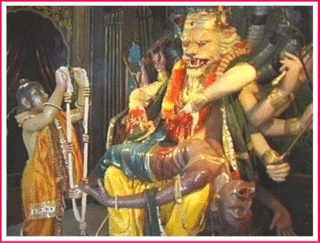Dakṣa said, “Consciousness is pristine, self-manifesting, beyond the grasp of anyone’s intellect, unified, carefree, and impervious to externalism (māyā). Yet it becomes the husband of the external world by entering into her. You only appear to be here in this non-pristine external world with us, in truth you are always situated within your conscious self.”
The Ṛtvik priests said, “O All-Attractive, he cannot understand the pure truth about you, nor can we. As a result of Rudra’s curse, all we can think about are the three selfish rewards to be gained by the supposedly religious deeds of so-called sacrifices. Our conception of religion is nothing more than a grand arrangement praying to modify fate.”
Comment: The “three selfish rewards gained by the supposedly religious deeds of so-called sacrifices” are ethics/morality (dharma) which solidifies ones economic security (artha) which allows one to prolong ones exposure to pleasure (kāma).
The external conception of religion is nothing but a big, fancy way of begging ‘the gods’ not to get what we really deserve – which is actually stupid.
The overseers of the sacrifice described the path of selfish-rewards in more detail, “The proliferative lifestyle is a relentless path infested with time’s fearsome deadly serpents, granting no rest from terrible and extreme dangers. We dare to tread this path because of our animalistic thirst for the mirage of external objects it seems to lead to. We lug along our heavy accumulations, pitting the path with potholes as we discover the bumpy reality that every pleasure is accompanied by distress. The stronger animals on the path strike fear into our hearts, and make us run into the desperate forest of depression. Oh, when will we slaves of lust, ignorant of our own self-interest, instead tread the welcoming path towards the refuge of your feet?”
Comment: This is a gem!
“proliferative livestyle” (utpattyadhvani) is the materialistic lifestyle where we try to get stuff and increase and produce.
Time (serpents) constantly threaten this lifestyle, for we always need more time to get more and produce more. It is a very dangerous path, but we enter it because we are like animals thirsty for the water in the mirage at the end of the path. The more we get and produce, the heavier the burden we have to lug along with us on this difficult path. It is a bumpy path because every happiness is something we have to work for, and work to maintain, and work not to lose. So every pleasure is accompanied by pain and stress.
We are not the only animals treading this path. There are many others, and many of them are more powerful and ferocious than us. They threaten us if we try to move towards the mirage faster than they do. In fear of our lives we run off the path, into the surrounding forest, a forest of sadness and depression.
Thus we are slaves to our thirsts, lusts. When will we look for a more welcoming path, one that leads to the shelter of Viṣṇu’s feet?
Rudra said, “Your precious, wish-fulfilling feet can certainly fulfill our every desire. That is why sages with no material illusions adore them as worshipable. My own mind is enamored by them, so why should I even notice whatever the ignorant, impure masses may say about me? I should always be supremely affectionate to everyone, like you are.”
Bhṛgu said, “Your external energy (māyā) lulls every embodied being, even Brahmā, into a dark sleep and treacherously steals their self-knowledge. Even at this very moment we cannot understand how you are within our true selves. You are the friend of the humble soul, so please don’t be upset with us for our ignorance.”
Comment: Each person is speaking “yathā-mati” (4.7.24) — according to their own level of realization. Bhṛgu has phrased it as if Māyā is the active agent stealing our self-knowledge and putting us into darkness. This is his realization of the truth. It seems to me that the actual truth presented overall and consistently throughout Bhāgavatam is that the soul is the active agent, and Māyā facilitates. The soul wants to be devoid of self-knowledge and sleep in the darkness of identifying with Māyā, because they soul is infatuated with her beauty. Māyā merely complies. See Kapila’s explanations of this in Canto 3. Kapila’s realization of the truth, in my opinion, is far superior to the realization expressed here by Bhṛgu.
Brahmā said, “Your intrinsic personality and form can’t be known to anyone who wants to see other delights. You are the ultimate origin of perception, senses, and sense objects, but your true self is certainly quite different from these things.”
Comment: We possess three things: perception, senses, and sense objects – all of these are transformations of Krishna’s external energy. We are qualified to experience all these transformations of Krishna’s external energy, but as long as we maintain facination with these things we are not qualified to experience Krishna’s internal energy.
The reason is that the nature of externalism is selfish, we look away from our true self (interior) towards an artificially separated, divorced concept of self. This makes it impossible to be sensitive to the internal reality.
The order in which people spoke is fascinating and seems very spontaneous. I also note that almost everyone seems to be elaborating on the main theme that Dakṣa said first.
Indra said, “It is true that you are beyond perception, Acyuta, yet you show yourself within this external universe, delivering blissful joy to our minds and eyes. Your eight arms with raised weapons will destroy all who hate the gods.”
Comment: Indra’s realization is almost funny. First it sounds really, really nice. “You show your beautiful form and bring joy to our mind and eyes.” Then he ruins it (imo) by explaining why he feels so joyful to see Viṣṇu: Because he has eight arms with lots of weapons to destroy Indra’s enemies. Indra is like the prime example of the materialist on the fearful path to mirages – he’s constantly worried about other animals on the path who might get bigger and stronger than him.
To be fair, Dakṣa’s realization was also simultaneously sublime and comical. The sublime part was how well he described consciousness. The comical part was how sexual his imagery was, being that he is the foremost progenitor. Anyway maybe that’s not so comical but quite accurate. Kapila deva also used these sexual terms when describing the relationship between Consciousness and matter.
Tagged: Bhagavata Purana, God, Spirituality, Srimad Bhagavatam, Understanding God
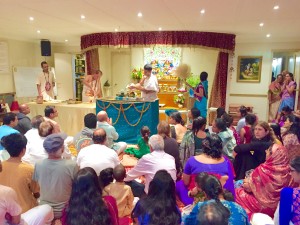
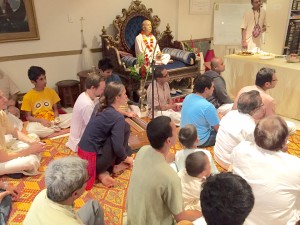
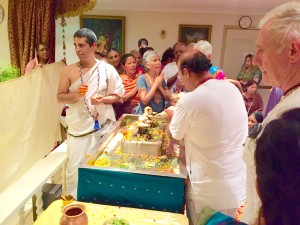
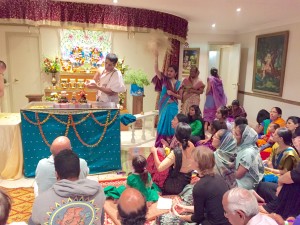
 If you’ve been to one of our monthly Latin nights, you’ll have seen Atma’s Director of Salsa Rico Andrade and his students on the dance floor. Rico teaches Beginners Salsa classes at Atma Yoga on Wednesdays at 7:30pm. Classes are $10. Check
If you’ve been to one of our monthly Latin nights, you’ll have seen Atma’s Director of Salsa Rico Andrade and his students on the dance floor. Rico teaches Beginners Salsa classes at Atma Yoga on Wednesdays at 7:30pm. Classes are $10. Check 

















 There are a number of verses in this twelfth chapter which point out that if you cannot follow the rules and regulations, that is a difficulty. There are many rules and regulations. If one cannot follow those, then Krsna says, “Then work for me.” But sometimes that is not possible due to family conditions. They will not allow it. You want to work for Krsna but they will not allow it. Then what? Then we can meditate on Krsna. We can do that. We can try and meditate on Krsna. Well, like that, there is chapter twelve.
There are a number of verses in this twelfth chapter which point out that if you cannot follow the rules and regulations, that is a difficulty. There are many rules and regulations. If one cannot follow those, then Krsna says, “Then work for me.” But sometimes that is not possible due to family conditions. They will not allow it. You want to work for Krsna but they will not allow it. Then what? Then we can meditate on Krsna. We can do that. We can try and meditate on Krsna. Well, like that, there is chapter twelve.


